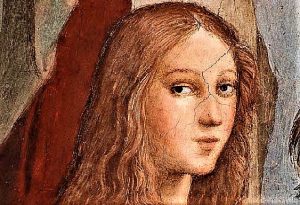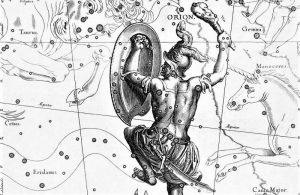Hypatia
Hypatia was the first female Hellenistic Neoplatonist philosopher, astronomer and mathematician, who lived in Alexandria, Egypt, which was then part of the Eastern Roman Empire. She was the director of the Neoplatonic school in Alexandria, where she taught philosophy and astronomy. She is the first mathematical woman whose life is reasonably well recorded.

Personal Information
- Born: Between 355 and 370
- Birthplace: Alexandria, Egypt
- When she died: 08/03/415
- Where did she die: Alexandria, Egypt
Who was Hypatia?
She was the first woman philosopher and Greek teacher from Alexandria. Daughter and disciple of Theon, she surpassed her father in astronomy and philosophy, standing out in science and mathematics from a very young age.
Biography of Hypatia
Hypatia was born in Alexandria, Egypt. His father, Theon of Alexandria, was an important philosopher and mathematician who devoted himself to research and to teaching in the Alexandria Museum. There is no data about her mother. Theon wanted his daughter to receive a very complete scientific education, so she was educated in the Museum itself and became part of it until his death.
In spite of being a woman full of physical and intellectual attributes, she refused to marry in order to dedicate herself completely to science. She specialized in several disciplines: philosophy, mathematics, astronomy and music. She worked teaching her knowledge in the Museum of Alexandria and even managed to direct it around the year 400.
She also wrote books on geometry, algebra and astronomy and improved the design of primitive astrolabes. She made cartography of celestial bodies, making a planisphere, and showed interest in mechanics.
Death
In that time, there was a problem of power between church and state, Hypatia was inclined to the state and to have liberal thoughts and advanced philosophical and scientific viewpoints and for this reason she was seen as a pagan woman, and she was the subject of disturbances between Christians and non-Christians.
The new bishop of Alexandria, Cyril called her a witch, and it is believed that he was the one who sent her to be killed in 415, Hypatia was beaten, stripped naked, raped, dragged through the city and murdered by the Parabolanos, a group of fundamentalist monks, since they felt threatened by their knowledge and thought. This event led Alexandria to decline.
Contributions
Hypatia’s greatest contribution to science was through her mathematical work, mainly in the area of algebra. She wrote an annotated version of Diophantus Arithmetic. She was the author of a “simplified” version of the Apollonius Conics, which she summarized in 8 books and she assisted her father in the revision of the Elements of Euclid, an edition that is currently used.
She made an important improvement of the astrolabe which improved its use in spherical astronomy. Hypatia also developed a device that was used to distil water, another to measure the water level and a hydrometer to measure the density of a liquid. All these devices were based on Archimedes’ previous work.
Hypatia Thought
Hypatia always sought to defend her thought and philosophy as subjects unrelated to dogma and religions. She never accepted blackmail from Christians. We can definitely say that she was a great woman who knew how to unite in a single being, thought, science and freedom, because for her, the movement of ideas was based on the essence of philosophy and the path to individual freedom. Also, following her thought, she was part of the pagan elite, remaining faithful to her old ideas and classic beliefs.
Astronomy
Hypatia’s work was lost many years ago. However, in Cyrene’s Sinesio charts, there are records that she made, and she also built an astrolabe, a hydroscope and a hydrometer, reflecting her intelligence, her technological ability and creativity, and her interest in astronomy.
Mathematics
Her research work was reflected in numerous manuscripts, such as the “Commentaries on Diophantine Arithmetic” which was considered the father of algebra and arithmetic and whose work focused on algebraic equations and number theory. Another of his important contributions in the area of mathematics was the edition of “the elements of Euclid” which contains a treatise on geometry.
Philosophy
Her philosophy was based on the Neoplatonist school, on a society that based its thought on the discovery of the cosmos as a universe ordered by laws. Thought was for her the ideal method for knowing the truth and improving knowledge.
She supported gender equality and the same conditions for both men and women, believing that people should have cultural independence, social class and gender because they all had a soul.
Importance of Hypatia
Hypatia’s importance lies mainly in the fact that she was one of the first women in history to contribute to the development of mathematics. Hypatia, managed to stand out among that group of wise men who competed in astronomy, philosophy, mathematics and other sciences. It was attended by students from all over the world, and from all religions. She taught mathematics, astronomy, philosophy and mechanics and became Plotinus’ Chair of Philosophy.
She became very famous and was known as “the philosopher“. Her scientific works were of great importance, such as, for example, her commentaries to the III book of Almagesto influencing Copernican theories. In addition, he built the astrolabe and a hydrometer to measure the density of water.
Phrases
Some of his most important phrases are the following:
- Defend your right to think, because even a wrong way of thinking is better than no thinking.
- All formal religions are fallacious and should not be accepted out of self-respect.
- Understanding the things around us is the best preparation for understanding the things beyond.
- God has created man as a sociable animal, with the inclination and under the need to live with beings of his own species, and has also endowed him with language, so that he may be the great instrument and common bond of society.
- Life is growth, and the more we travel, the more truth we can understand. Understanding the things around us is the best preparation for understanding the things beyond.
- Fables should be taught as fables, myths as myths and miracles as poetic fantasies. To teach superstitions as if they were truths is terrible. The mind of the child accepts and believes them, and only with great pain, and perhaps tragedy, will he be able to get rid of them with age.
How to cite this article?
Briceño V., Gabriela. (2019). Hypatia. Recovered on 3 January, 2025, de Euston96: https://www.euston96.com/en/hypatia/









